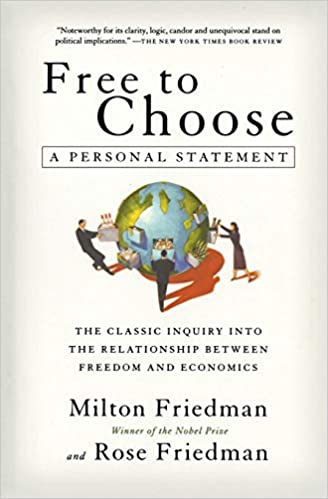A Brief Book Summary from Books At a Glance
By Benjamin J. Montoya
About the Authors
Milton Friedman (1912–2006), economist and former presidential adviser, was the author of a number of books, including Capitalism and Freedom and Tyranny of the Status Quo, also written with his wife, Rose Friedman (1910–2009).
Introduction
Free to Choose is about the relationship between personal freedom and economic freedom. Although Friedman covered this same topic in Capitalism and Freedom, Free to Choose is intended to provide a more concrete approach.
Table of Contents
Introduction
Chapter 1 The Power of the Market
Chapter 2 The Tyranny of Controls
Chapter 3 The Anatomy of Crisis
Chapter 4 Cradle to Grave
Chapter 5 Created Equal
Chapter 6 What’s Wrong with Our Schools?
Chapter 7 Who Protects the Consumer?
Chapter 8 Who Protects the Worker?
Chapter 9 The Cure for Inflation
Chapter 10 The Tide Is Turning
Summary
Chapter 1: The Power of the Market
The market is a powerful thing that affects us all in so many ways. First, it helps us understand the relationship of personal freedom and economic freedom. When we compare free markets to government-controlled markets, we see that very thing.
Second, the market is shown to be powerful because of the importance of pricing. Prices have three functions:
- They transmit information.
- They provide incentive to adopt those methods of production that are least costly and thereby use available resources for the most highly valued purposes.
- They determine who gets how much of the product, or the distribution of income.
Third, the market in the US was meant to be free with little governmental involvement. Adam Smith has laid out a philosophy of the government’s involvement as an “umpire” instead of a “participant.” The difference lies in the umpire sets the rules for fair-play whereas the participant, or player, is actively involved in the game. There are all kinds of problems with the government becoming an active part of the market, not the least of which are that once the government gets involved, they rarely get out of the game, so to speak. They stay involved.
Fourth, the larger problem is governmental involvement in the market is that it encroaches upon our individual freedom to make free transactions with whomever we like. That is the basis for personal and economic freedom. The exchange must be voluntary and such that both parties believe they benefit from the exchange in some way. That is the underlying insight of Adam Smith’s Wealth of Nations.
Chapter 2: The Tyranny of Controls
Being free to choose in economic transactions is a major component of personal freedom. The problem we face today is that the government, in the US and elsewhere, has gotten so involved in the economy that we are living under the tyranny of controls.
For example, the government has gotten involved in international trade, claiming that it is of their interest to do so, using tariffs and the like. The problem is that their involvement in this way and others reduces the voluntary nature of the transaction. People ought to be free to buy from whomever they want, in a voluntary way. That freedom also ensures that monopolies do not form, because then American companies have to compete with the companies of the world.
[To continue reading this summary, please see below....]The remainder of this article is premium content. Become a member to continue reading.
Already have an account? Sign In
